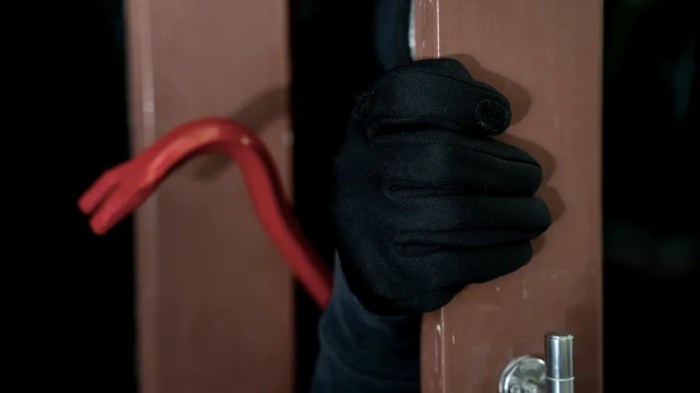Burglar sues homeowner after falling on knife – this intriguing legal conundrum raises fundamental questions about homeowner liability, the burden of proof, and the complex interplay between property rights and personal safety. As we delve into this captivating case, we will explore the legal principles that govern such disputes, analyze the ethical implications, and examine the potential impact on homeowners’ sense of security and privacy.
The narrative unfolds as a homeowner faces a peculiar lawsuit filed by a burglar who sustained injuries while attempting to break into their property. This incident challenges our understanding of legal responsibility and raises questions about the extent to which homeowners can be held accountable for injuries incurred by trespassers.
Homeowner’s Legal Liability

The legal liability of homeowners in cases of injuries sustained by trespassers is governed by the principles of premises liability. Premises liability imposes a duty on property owners to maintain their premises in a reasonably safe condition for visitors, including those who enter without permission.
However, the extent of this duty varies depending on the status of the visitor, with trespassers generally receiving the least protection.
Concept of “Premises Liability” and Its Applicability to Burglars, Burglar sues homeowner after falling on knife
Premises liability is based on the concept that property owners have a legal obligation to protect individuals from foreseeable harm that may arise from the condition of their property. This duty extends to trespassers, but the level of care owed to them is lower than that owed to invitees or licensees.
In the case of burglars, courts have generally held that homeowners owe them a limited duty of care. This duty does not require homeowners to make their property burglar-proof, but it does require them to take reasonable steps to prevent foreseeable injuries.
For example, homeowners may be liable for injuries sustained by burglars if they fail to secure their doors and windows or if they create a dangerous condition on their property that could reasonably be expected to cause harm.
Examples of Cases Where Homeowners Have Been Held Liable for Injuries to Burglars
- In one case, a homeowner was held liable for injuries sustained by a burglar who fell through a skylight that was not properly secured.
- In another case, a homeowner was held liable for injuries sustained by a burglar who was electrocuted by an exposed electrical wire.
- In a third case, a homeowner was held liable for injuries sustained by a burglar who was shot by a homeowner who believed the burglar was armed.
Burdens of Proof

In cases involving burglar injuries on homeowner’s property, the burden of proof lies with the burglar to establish the elements of a successful lawsuit.
Elements That a Burglar Must Prove
- The homeowner owed the burglar a duty of care.
- The homeowner breached that duty of care.
- The homeowner’s breach of duty caused the burglar’s injuries.
- The burglar suffered damages as a result of their injuries.
Defenses That Homeowners Can Raise
Homeowners can raise a number of defenses to rebut the burglar’s claims, including:
- The burglar was contributorily negligent.
- The homeowner was justified in using force to protect their property.
- The burglar’s injuries were not caused by the homeowner’s negligence.
Comparative Negligence

Comparative negligence is a legal doctrine that allows courts to apportion fault between the plaintiff and the defendant in personal injury cases. In burglar injury cases, comparative negligence can be used to reduce the amount of damages that a burglar is awarded if they are found to have been partially responsible for their own injuries.
How Courts Determine the Degree of Fault
Courts determine the degree of fault attributable to both the homeowner and the burglar by considering a number of factors, including:
- The nature of the homeowner’s duty of care.
- The foreseeability of the burglar’s injuries.
- The extent to which the burglar’s own conduct contributed to their injuries.
Examples of How Comparative Negligence Can Affect the Outcome of a Lawsuit
- In one case, a burglar who was injured when he fell through a skylight was awarded reduced damages because he was found to have been 50% contributorily negligent.
- In another case, a burglar who was shot by a homeowner was awarded no damages because he was found to have been 100% contributorily negligent.
Insurance Coverage

Homeowner’s insurance policies typically provide coverage for third-party injuries, including injuries sustained by burglars. However, there are some exclusions and limitations that may apply to burglar injury claims.
Coverage Typically Provided
Homeowner’s insurance policies typically provide coverage for the following types of injuries sustained by burglars:
- Bodily injuries.
- Medical expenses.
- Lost wages.
- Pain and suffering.
Exclusions and Limitations
Homeowner’s insurance policies may contain exclusions or limitations that apply to burglar injury claims. These exclusions and limitations may vary from policy to policy, but they commonly include:
- Intentional injuries.
- Injuries sustained while committing a crime.
- Injuries sustained by burglars who are under the influence of drugs or alcohol.
Social and Ethical Considerations: Burglar Sues Homeowner After Falling On Knife
The issue of homeowner liability for injuries sustained by burglars raises a number of social and ethical concerns.
Ethical Implications of Holding Homeowners Liable
Some argue that it is unfair to hold homeowners liable for injuries sustained by burglars who are trespassing on their property. They argue that burglars are responsible for their own actions and that homeowners should not be held liable for injuries that they did not intend to cause.
Societal Concerns
There are also concerns that holding homeowners liable for burglar injuries could encourage frivolous lawsuits or deter homeowners from protecting their property. If homeowners are afraid of being sued, they may be less likely to take steps to secure their homes, which could lead to an increase in crime.
Impact on Homeowner’s Sense of Security and Privacy
Finally, there is the concern that burglar injury lawsuits could have a negative impact on the homeowner’s sense of security and privacy. If homeowners are constantly worried about being sued, they may feel less safe in their own homes and may be less likely to open their doors to strangers.
FAQ Summary
Can a homeowner be held liable for injuries sustained by a burglar?
Yes, in certain circumstances, homeowners may be held liable for injuries sustained by burglars under the legal principle of premises liability.
What is the burden of proof in a case where a burglar sues a homeowner for injuries?
The burglar must prove that the homeowner was negligent in maintaining their property and that this negligence directly caused the burglar’s injuries.
How does comparative negligence affect burglar injury cases?
Comparative negligence apportions fault between the homeowner and the burglar, potentially reducing the amount of damages the burglar can recover.
Does homeowner’s insurance typically cover injuries sustained by burglars?
Most homeowners’ insurance policies provide coverage for third-party injuries, including those sustained by burglars, subject to certain exclusions and limitations.